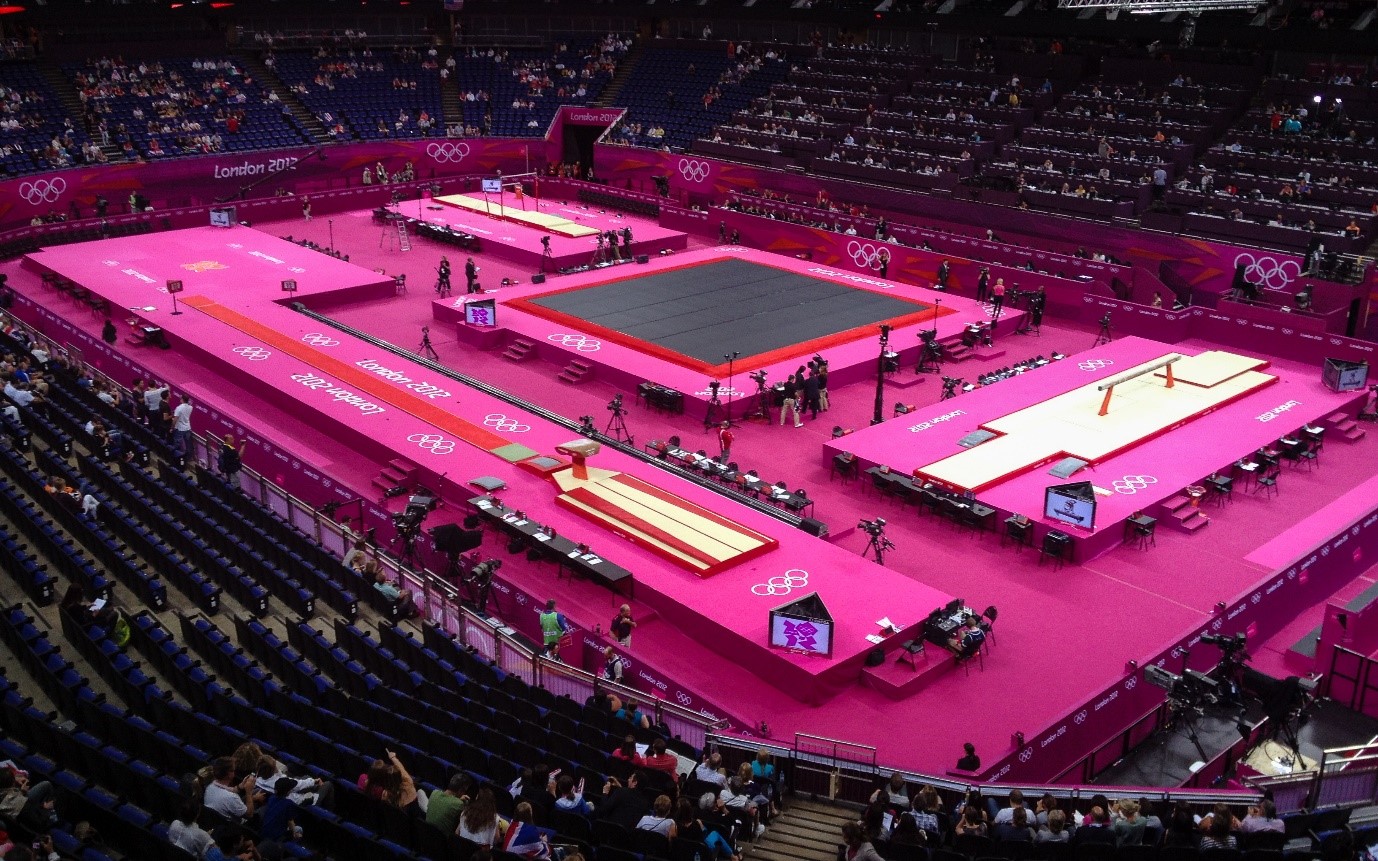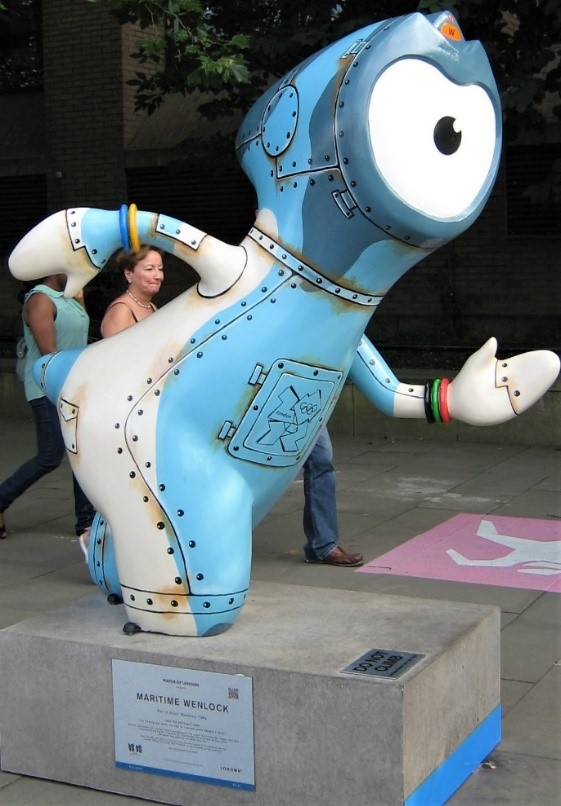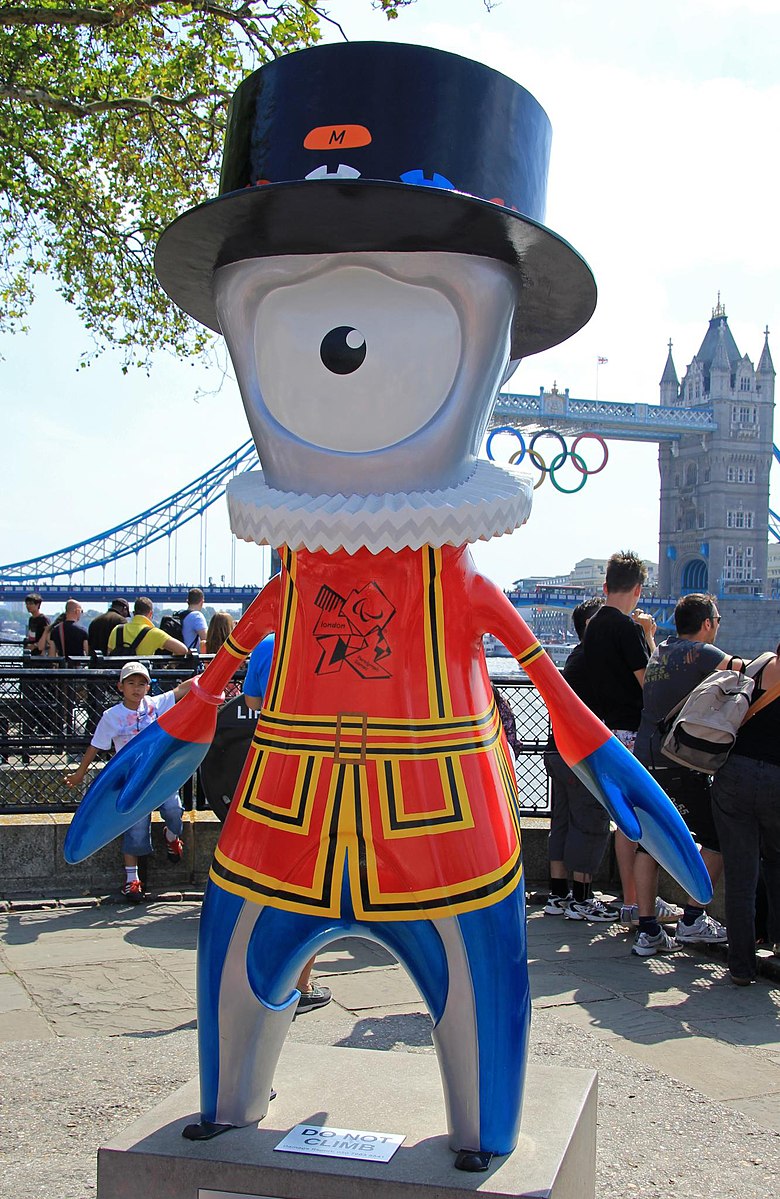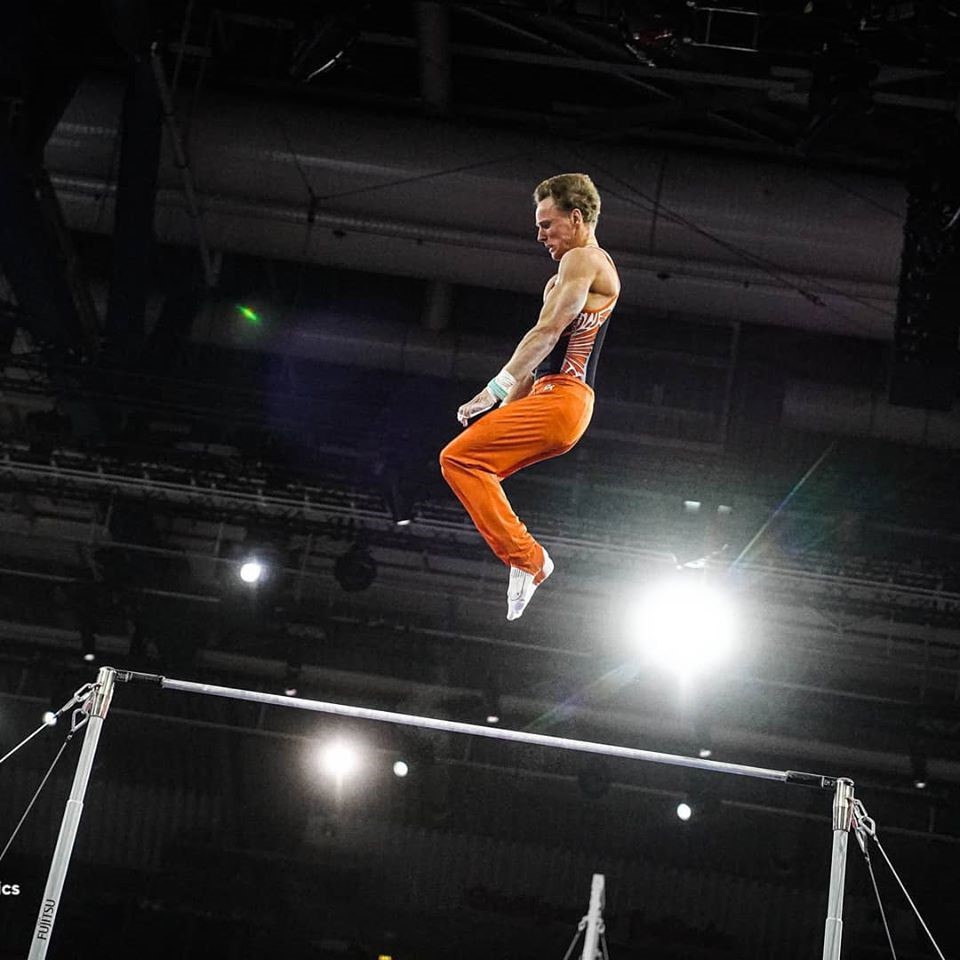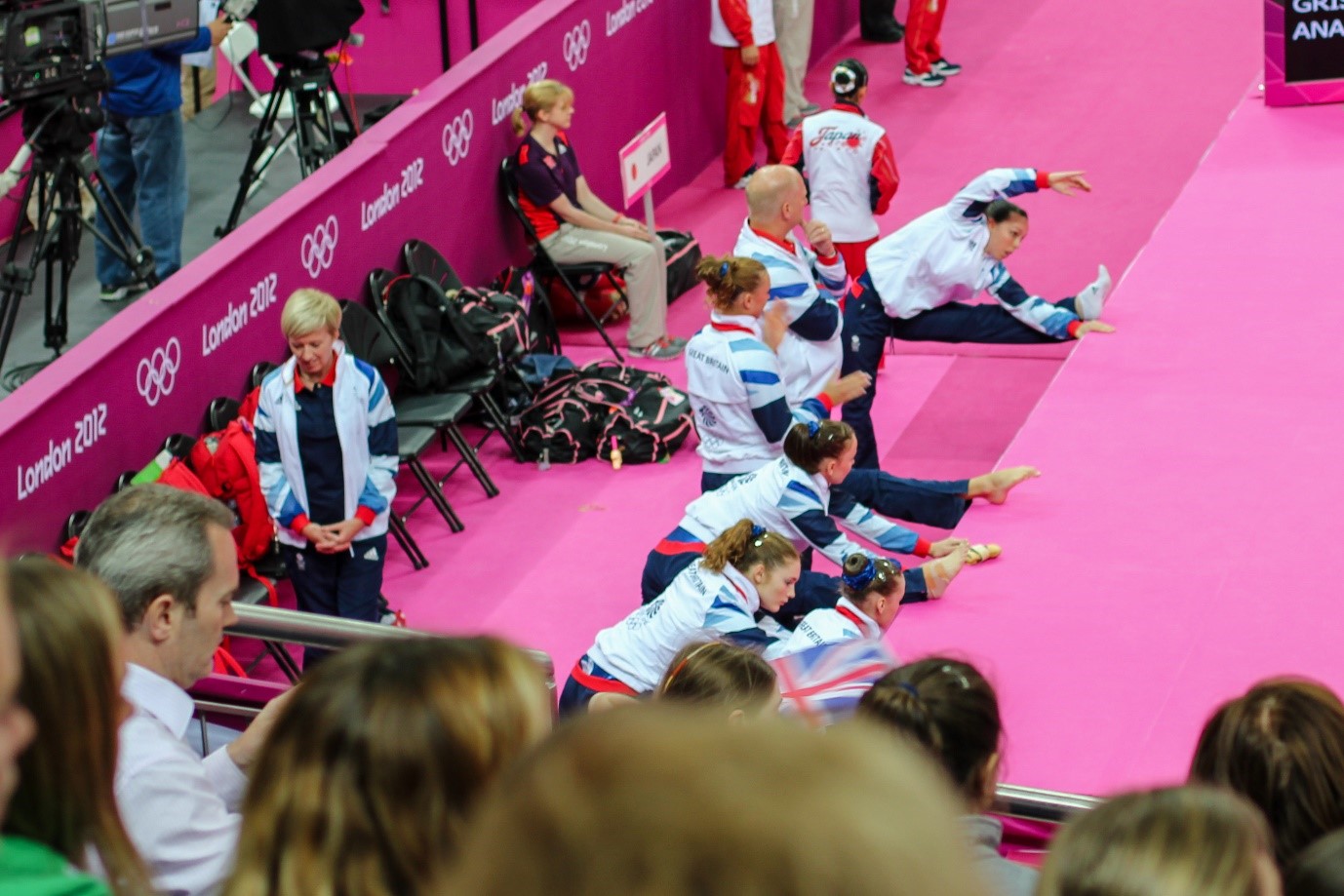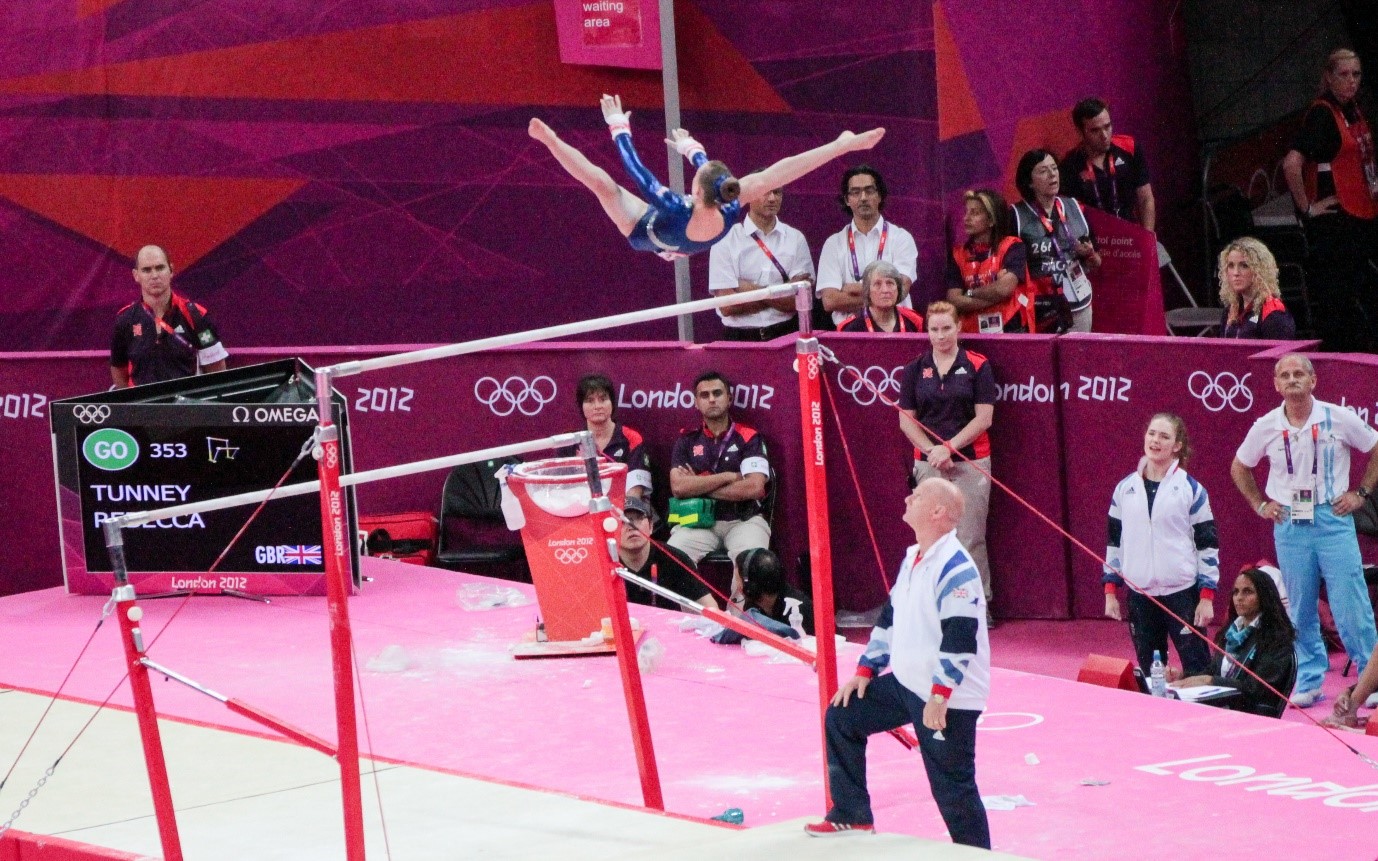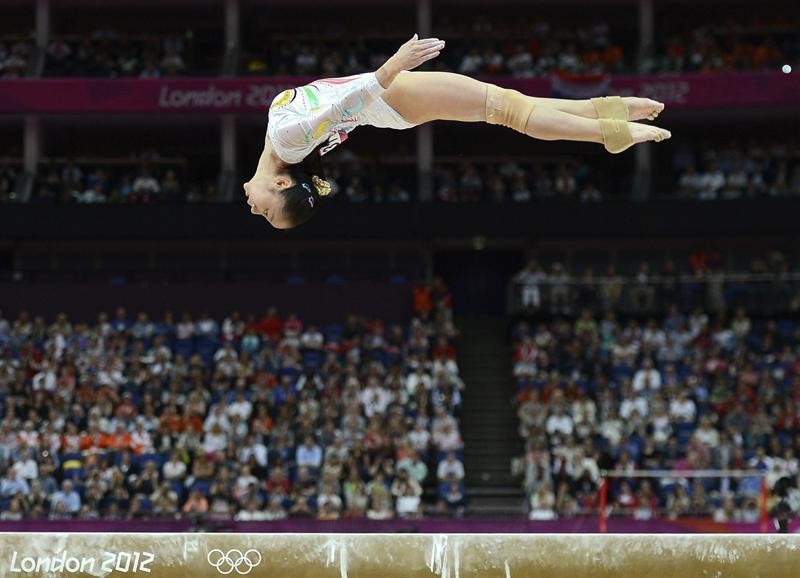OLYMPIC REPORT
2012
LONDON
North Greenwich Arena from July 28th – August 7th
98 gymnasts competed in the both the men’s and the women’s events, with gymnasts coming from 33 nations for the men and 39 for the women.
There was a break in the artistic programme to allow for Trampoline which took place from the 3rd – 4th August. 16 males from 13 nations and 16 females from 14 nations competed.
Rhythmic Gymnastics took place at the Wembley Indoor Arena from the 9th – 12th August. 92 gymnasts and 24 nations.
Main picture – Medal ceremony for the Women’s All-Around competition. Gabby Douglas taking the gold. Mustafina and Komova in 3rd and 2nd positions.
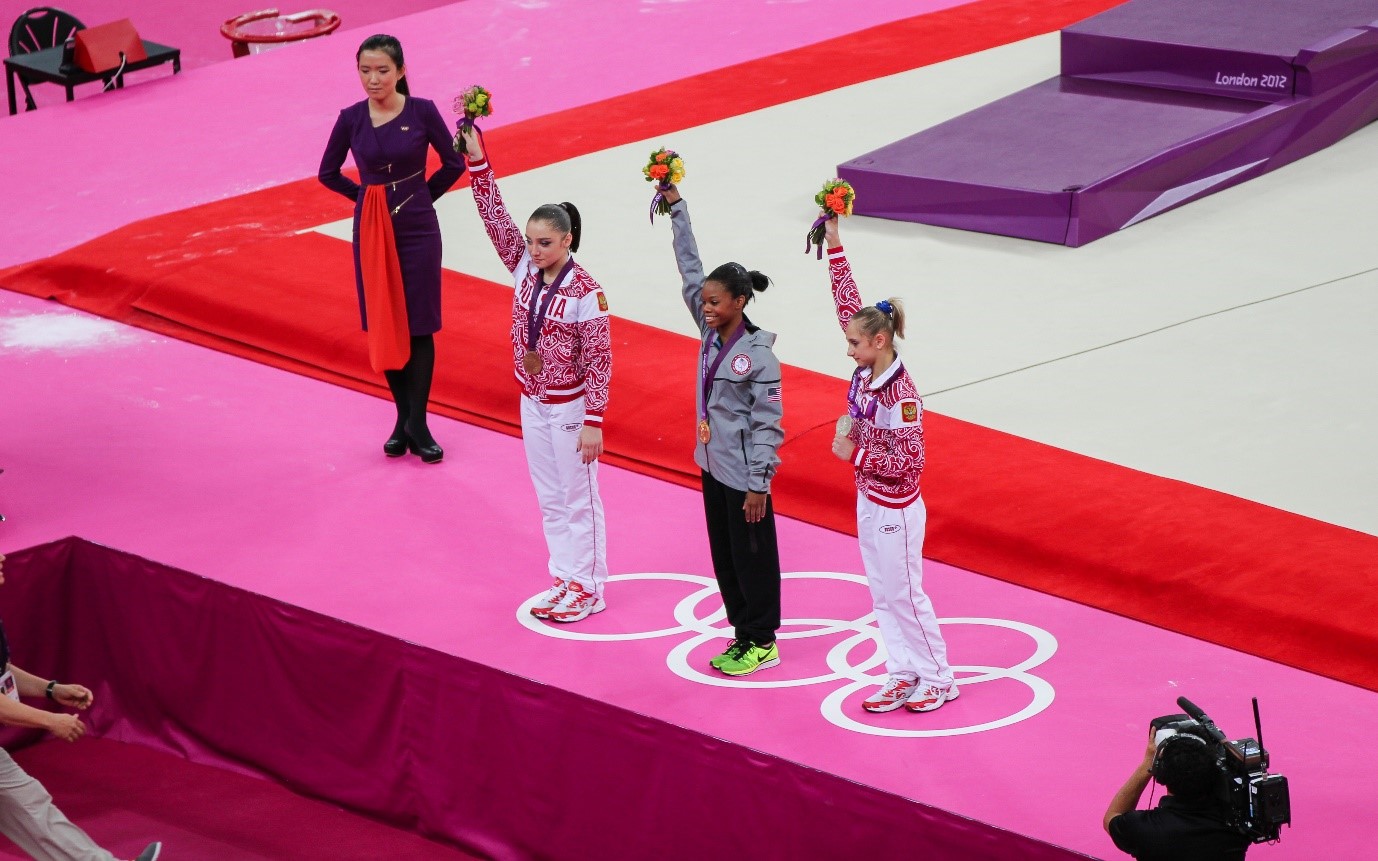
THE LONDON BID
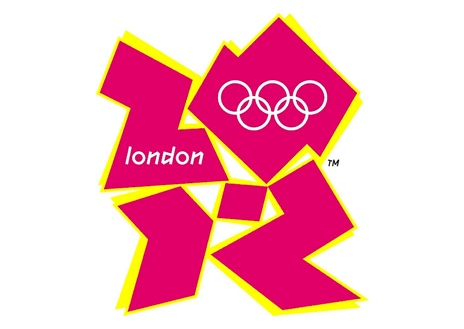
It all started on the 6th July 2005 with the announcement that London had won the bid for the 2012 Olympics. This wasn’t going to be an austerity Olympics, London wasn’t going to be making do as they did in 1908 and in 1948.
The 02 arena in North Greenwich which some had viewed with scepticism turned out to be a great venue for gymnastics. It had been used for the 2009 Worlds where most of the problems were solved and then again for an Olympics Test Event. The visiting nations loved the fact that they were right on the river and that the centre of London was so accessible.
BRITISH PREPARATIONS
Where we had failed in 1948 with lack of planning and organisation we now excelled. London was all spruced up and the mascots of Wenlock and Mandeville created lots of interest around the city.
The organisation of the Games Makers was something that many people remember with fondness and respect and the organisation by British Gymnastics events team, was run with its typical efficiency and attention to detail.
The excitement in the lead up to the games, grew and grew. Once we as Games Makers (volunteers), got on the underground on our way to the 02 Arena in North Greenwich we knew we were heading for hard work but also some amazing times.
Once the Olympics started the atmosphere was electric. Always journeying on the train you could pick up the free Metro paper. It was as if over the course of days that it seemed that suddenly the British press had discovered gymnastics and most importantly the British team. Every other day Louis would be in the paper whether an advert or in an article. The Times newspaper went to town on the Olympics doing a wrap around front cover for every day of the Olympics featuring an athlete or sport. We, gymnastics got our fair share of the coverage.
British Qualification
The qualification event was the 2011 World Championships in October in Tokyo. The women’s team qualified in 5th place giving them the spot that they wanted.
Not so the men. From Great Britain’s previous performances, they were expected to qualify 2 teams but the men had a disaster on high bar, coming 20th on this apparatus and not doing so well on rings either. Teams had to get into the top 8 to qualify. Even with better performances on the other 4 apparatus it was impossible to make up this deficit, so the team only managed 10th place. The gymnasts must have been gutted.
They knew then that they had to do well at the test event in January 2012 at the 02, the North Greenwich Arena. Did they do well? They galloped home, coming 1st in the team event, the position that they wanted, scoring 358.227 nearly 8 marks ahead of the 2nd placed team France.350.659; their place was assured along with France, Spain and Italy.
Dan Purves recalls that the test event was the best thing that could have happened to the men’s team. They were able to get used to the arena and the kit; what confidence that must have given them.
For trampoline, only one gymnast qualified.
In rhythmic gymnastics, 1 gymnast had qualified from the previous World Championships. The British Group were allowed to enter via the Host Nation qualification.
British Representation
Team manager Tim Jones
Artistic Gymnastics Coaches & Judges
Men: Eddie Van Hoof and Andre Popov
Women: Performance Director Adrian Stan and coaches Amanda Reddin and Colin Still
Judges Andy Tombs, Robin Leeworthy
Gymnasts – men
Kristian Thomas Earls Gymnastic Club Dudley West Midlands coaches Michelle Bradley and Andre Popov
Max Whitlock South Essex Gymnastic Club Basildon coach Scott Hann
Louis Smith Huntingdon Gymnastic Club, coach Paul Hall
Dan Purves Southport YMCA, coaches Jeff Brooks and Andre Popov
Sam Oldham unattached, coach Sergei Sizhanov
Gymnasts – women
Imogen Cairns The Academy Portishead Bristol, coach Liz Kincaid
Beth Tweddle, City of Liverpool Gymnastic Club, coach Amanda Reddin
Jennifer Pinches, City of Liverpool Gymnastic Club, coach Amanda Reddin
Hannah Whelan, City of Liverpool Gymnastic Club, coach Amanda Reddin
Rebecca Tunney, City of Liverpool Gymnastic Club, coach Claire Duffy
Amanda says that she was very proud of the fact that four of the team came from the City of Liverpool Gymnastic Club She was also proud that Claire, Tunney’s coach had been one of Amanda’s gymnasts.
Amanda’s greatest objective was to make sure that her gymnast, Beth Tweddle got an Olympic medal of any colour. Beth who was a world champion three times over and had won European gold six times was still determined to win her dream medal, an Olympic medal.
Trampoline gymnasts
Kat Driscoll Apollo, personal coach Bill Leach
Official coach Tracy Whittaker Smith
Judge Peter Heames
Rhythmic gymnasts
Francesca Jones from The City of Birmingham Gymnastics Club, coach Lisa Higgins.
The following gymnasts made up the rhythmic group.
Rachel Smith, City of Coventry, coaches Hannah Walker and Marion Sands
Francesca Fox, Bath, coach Sarah Moon
Georgina Cassar, GRGA Gibralter, coach Sally Holmes
Jade Faukner, Esprit, coach Deb Hows
Louisa Pouli, Elena Rhythmic Gymnastics Club, coach Sarah Smith
Lynne Hutchinson, Bath, coach Sarah Moon
THE RESULTS
MEN’S TEAM FINAL
| RANK | COUNTRY | SCORE |
|---|---|---|
| 1 | CHN | 275.997 |
| 2 | JPN | 271.952 |
| 3 | GBR | 271.711 |
| 4 | UKR | 271.526 |
| 5 | USA | 269.952 |
| 6 | RUS | 269.603 |
| 7 | GER | 268.019 |
| 8 | FRA | 265.441 |
In the qualification rounds the States romped away coming out 1st scoring 275.34, Russia 2nd 272.595 and 3rd. Great Britain 272.420. Japan and China were down in 5th and 6th.
Obviously, the British boys were very excited to have made the team final after their qualification hurdle at the beginning of the year.
Team Final – the story of the British boys.
The final event was going to be so different with any errors meaning major set-backs to the teams; it was a three up and three to score format.
Kristian Thomas remembers, ‘As a team we were confident that we could win a medal but we kept these thoughts to ourselves. We went out to do well but still to try and enjoy ourselves not putting ourselves under pressure. Before the competition Eddie (van Hoof), the team coach said, think of this as another control competition.’
The British boys in accordance with their team placing started on pommels, therefore finishing on floor. The leaders, USA and Russia starting on floor so that they would finish on high bar.
The boys started well by finishing in 2nd place after pommels horse with Ukraine in the lead after starting on vault. However, the next piece was rings, notoriously not so good for the British and they ended up in 5th place. Vault took them up to 3rd position. Kristian scored an amazing 16.55 for his vault, a Yurchenko double piked, in the team final. An American coach was heard phoning a friend in the States, announcing that he had just seen the most perfect vault. This score was only bettered by Yang In the vault final scoring 16.6 after Yang upped the difficulty on his first vault to a massive 7.4
They worked out of their skins but with a couple of errors, Max with a slight stumble back on parallel bars landing and Sam falling from the high bar but still scoring 14.00. Kristian was up next, keeping cool, he scored 15.2.
Before floor they knew that they had to do near perfect routines. As well as watching the Japanese, they were also watching the Ukrainians another threat, who were performing on rings.
The British Men – winning bronze at the Team Final
What of the Japanese?
As a result of their qualification score Japan started on rings and finished on pommels. Whilst the British team were performing great floor routines so Tanaka of Japan fell from the pommels losing 1.00. Next up for Japan was Uchimura.
The final apparatus in the team final, and Uchimura fell on his pommel horse dismount. He had been held for TV purposes as Kristian Thomas the GB captain was finishing his floor exercises. As a result of his fall Uchimura only scored 13.466.
GB had finished on floor, with 3 amazing routines, averaging 15.377. The crowd went mad as Kristian the last man up, once again pulled out all the stops and landed his last tumble, a double arabian, as Mitch Fenner would have said, on a sixpence.
As the score went up, 15.433, so the official total for the teams and their positions went:-
1st China, 2nd Great Britain 3rd Ukraine and 4th Japan. Well, the crowd went wild, the Japanese team looked stunned and so did the Japanese team manager. This was the effect of Uchimura’s fall on pommels.
Great Britain was 0.2 ahead of Ukraine and 0.5 ahead of Japan.
An observing brevet judge explains:
The D1 judge on pommels was Spanish and his colleague the D2 judge was Japanese. Neither judge credited Uchimura’s dismount. The apparatus supervisor who was American also concurred.
The Japanese team manger realising the danger they were in, appealed the judges’ decision. The entire Men’s technical committee headed by Adrian Stoica, the MTC chairman from Romania reviewed the video and over turned the judges’ and supervisors’ decision and credited the dismount.
At the judges’ meeting the following morning Mr Stoica claimed that in the interests of sporting justice the panel overturned the decision. He claimed they reviewed the video and decided the dismount counted. He referred to the noise the crowd made during Thomas’s landing at the end of his floor exercise.
Uchimura’s score was raised from 13.466 to 14.166 an amazing 0.7 increase. Upon asking the observing judge why 0.7 he replied. “Who knows. None of it made any sense at the time and no satisfactory explanation was forthcoming. None of the arithmetic made sense. The MTC and its chairman overruled the supervisor. (Men’s Technical Committee)
What a surprise medal for GB. Even though they had been dropped from 2nd to 3rd, the team was still delighted.
‘This team isn’t just a one hit wonder’ said Smith. ‘it’s a beautiful day for the team and British Gymnastics. Bronze is good, for now. Let’s not get greedy.’
Dan Purvis remembers those times. ‘It was breath-taking and unexpected to get third place. Even though the team had talked about the possibility of a medal, I wasn’t sure that they could really do it.’
Team captain Thomas said, “It’s an Olympic medal at the end of the day. That’s what dreams are made of”
MEN’S ALL-AROUND FINAL
| RANK | NAME | COUNTRY | SCORE |
|---|---|---|---|
| 1 | Kohei Uchimura | JPN | 92.690 |
| 2 | Marcel Nguyen | GER | 91.031 |
| 3 | Danell Leyva | USA | 90.698 |
| 4 | Mykola Kuksenkov | UKR | 90.432 |
| 5 | David Belyavskiy | RUS | 90.297 |
| 6 | Kazuhito Tanaka | JPN | 89.407 |
| 7 | Kristian Thomas GBR | GBR | 89.406 |
| 8 | John Orozco | USA | 89.331 |
No mistake this time on pommels for Uchimura scoring 15.066.
Dan Purvis qualified in 10th place and came 13th in final with 88.332. A mistake on parallel bars stopped him gaining a higher position but a great result for the two British boys. Uchimura was a worthy champion working as though it was a walk in the park, one of the world’s all-time greats.
GBR in Qualification
Sam Oldham 74.599 5 apparatus
Max Whitlock 74.232 5 apparatus
Louis Smith 28.833 2 apparatus
MEN’S FLOOR FINAL
| RANK | NAME | COUNTRY | DIFFICULTY | SCORE |
|---|---|---|---|---|
| 1 | Kai Zou | CHN | 6.9 | 15.933 |
| 2 | Kohei Uchimura | JPN | 6.7 | 15.800 |
| 3 | Denis Ablyazin | RUS | 7.1 | 15.800 |
| 4 | Enrique Gonzalez | CHI | 6.5 | 15.366 |
| 5 | Jacob Dalton | USA | 6.4 | 15.333 |
| 6 | Alexander Shatilov | ISR | 6.6 | 15.333 |
| 7 | Flavius Koczi | ROU | 6.7 | 15.100 |
| 8 | Marcel Nguyen | GER | 6.6 | 14.966 |
MEN’S POMMEL HORSE FINAL
| RANK | NAME | COUNTRY | DIFFICULTY | SCORE |
|---|---|---|---|---|
| 1 | Krisztian Berki | HUN | 6.9 | 16.066 |
| 2 | Louis Smith | GBR | 7.0 | 16.066 |
| 3 | Max Whitlock | GBR | 6.6 | 15.600 |
| 4 | Alberto Busnari | ITA | 6.6 | 15.400 |
| 5 | Cyril Tommasone | FRA | 6.5 | 15.141 |
| 6 | Vitalii Nakonechnyi | UKR | 6.3 | 14.766 |
| 7 | David Belyavskiy | RUS | 6.3 | 14.733 |
| 8 | Vid Hidvegi | HUN | 6.3 | 14.300 |
Max Whitlock – winning bronze on Pommel Horse
Silver for Louis Smith. Louis once again had to deal with the ‘countback’ rule in the event of a tie. With a higher start score, his execution did not match Berki’s.
Louis says of his preparation, I had been working on a 7.1 start value but only with a 30% success rate. He therefor decided to use the middle difficulty routine, the 7.0. Louis said on reflection that he was happy with his choice and when watched in slow motion the best routine won – Berki. (The Times Book of the Olympics.)
Max qualified on 14.9 in 8th slot. Berki only had 15.033 in qualification qualifying in 5th slot. Louis qualified as the leader.
Scott Hann, Max’s coach, recalls – Max didn’t do his best routine in qualifications and we didn’t think he would make the final. I sat with him through the remaining rounds eagerly watching every routine performed. It was an intense wait but after what seemed hours and hours of waiting, we learned he had narrowly scraped into the final. Neither of us could believe it, but we were so happy. Time to prepare for his first Olympic individual final. I had several people tell me that there is no way he can win a medal. He’s not a name! He’s not got the start score! He’s not got the experience! But I knew he had the potential, now it was about bringing that potential to life! The head coach said to me – I have a good feeling about today. He went out and delivered a near perfect routine and proved all the doubters wrong. A bronze medal and a spring board to an amazing career.
MEN’S RINGS FINAL
| RANK | NAME | COUNTRY | DIFFICULTY | SCORE |
|---|---|---|---|---|
| 1 | Arthur Zanetti | BRA | 6.8 | 15.900 |
| 2 | Yibing Chen | CHN | 6.8 | 15.800 |
| 3 | Matteo Morandi | ITA | 6.8 | 15.733 |
| 4 | Aleksandr Balandin | RUS | 6.7 | 15.666 |
| 5 | Denis Ablyazin | RUS | 6.6 | 15.633 |
| 6 | Tommy Ramos | PUR | 6.8 | 15.600 |
| 7 | Yordan Yovchev | BUL | 6.6 | 15.108 |
| 8 | Federico MolinarI | ARG | 6.7 | 14.733 |
At the age of 39, Yordan Yovchev gets into his 5th rings final, in his 6th Olympics. He first competed in 1992, he didn’t make the final but came 3rd in 2000 and 2nd in 2004. Bulgaria recognised his contribution to Bulgarian sport by getting him to carry their flag in the opening ceremony. He is now President of the Bulgarian Gymnastics Federation.
MEN’S VAULT FINAL
| RANK | NAME | VAULT 1 | DIFFICULTY | VAULT 2 | DIFFICULTY | FINAL SCORE |
|---|---|---|---|---|---|---|
| 1 | Hak Seon Yang KOR | 16.466 | 7.4 | 16.600 | 7.0 | 16.533 |
| 2 | Denis Ablyazin RUS | 16.433 | 7.0 | 16.366 | 7.2 | 16.399 |
| 3 | Igor Radivilov UKR | 16.400 | 7.0 | 16.233 | 7.0 | 16.316 |
| 4 | Enrique Gonzalez CHI | 16.400 | 7.0 | 15.966 | 6.6 | 16.183 |
| 5 | Samuel Mikulak USA | 16.100 | 7.0 | 16.000 | 6.6 | 16.050 |
| 6 | Isaac Botella Perez ESP | 15.900 | 6.6 | 15.833 | 6.6 | 15.866 |
| 7 | Flavius Koczi ROU | 16.100 | 7.0 | 15.166 | 6.2 | 15.633 |
| 8 | Kristian Thomas GBR | 16.366 | 7.0 | 14.700 | 6.6 | 15.533 |
MEN’S PARALLEL BARS FINAL
| RANK | NAME | COUNTRY | DIFFICULTY | SCORE |
|---|---|---|---|---|
| 1 | Zhe Feng | CHN | 7.0 | 15.966 |
| 2 | Marcel Nguyen | GER | 6.8 | 15.800 |
| 3 | Hamilton Sabot | FRA | 6.7 | 15.566 |
| 4 | Kazuhito Tanaka | JPN | 6.7 | 15.500 |
| 5 | Daniel Corral Barron | MEX | 6.6 | 15.333 |
| 6 | Emin Garibov | RUS | 6.5 | 15.300 |
| 7 | Vasileios Tsolakidis | GRE | 6.5 | 15.300 |
| 8 | Yusuke Tanaka | JPN | 6.4 | 15.100 |
| 9 | Chenglong Zhang | CHN | 6.3 | 13.808 |
What a celebration in the Tanaka family, the brothers coming 4th and 8th!
MEN’S HIGH BAR FINAL
| RANK | NAME | COUNTRY | DIFFICULTY | SCORE |
|---|---|---|---|---|
| 1 | Epke Zonderland | NED | 7.9 | 16.533 |
| 2 | Fabian Hambuchen | GER | 7.5 | 16.400 |
| 3 | Kai Zou | CHN | 7.9 | 16.366 |
| 4 | Chenglong Zhang | CHN | 7.7 | 16.266 |
| 5 | Danell Leyva | USA | 7.2 | 15.833 |
| 6 | Jonathan Horton | USA | 6.8 | 15.466 |
| 7 | Emin Garibov | RUS | 7.1 | 15.333 |
| 8 | Jihoon KIM | KOR | 7.1 | 15.133 |
Kristian Thomas GBR 1st reserve
Sam Oldham GBR 2nd reserve
26 year old Zonderland (left) was always the favourite. Those that were neutral wanted him to win. He had delighted people for so many years with his antics on high bar. Not for nothing was he called the flying dutchman. He qualified in first position with a start score of 7.5, the same as Zhang from China.
In the final he upped his game going for a 7.9 difficulty, which payed off. His combination of 3 releases in a row just wowed everyone, first with a twist and third with a twist, and then throwing in a fourth release and regrasp later and nailing his double twisting double back. You didn’t have to be a gym fan to be amazed. It was a privilege to be there at the side of the arena.
Dan Purves recalls. I was amazed and overwhelmed by the Olympics. I have done three world championships and I thought that the Olympics would just be the same but it was nowhere close; the audience, the celebrities and the village was amazing; I wish I had taken more notice of it all.
WOMEN’S TEAM FINAL
The British team, photo Yvette Austin.
| RANK | COUNTRY | SCORE |
|---|---|---|
| 1 | USA | 183.596 |
| 2 | RUS | 178.530 |
| 3 | ROU | 176.414 |
| 4 | CHN | 174.430 |
| 5 | CAN | 170.804 |
| 6 | GBR | 170.495 |
| 7 | ITA | 167.930 |
| 8 | JPN | 166.646 |
Beth Tweddle had the highest bar score in the competition 15.833
The Americans had a massive vault score of 48.132 with Maroney posting a 16.233, this being her only contribution to the team but what a contribution. They went on to win the beam and floor but only coming third on bars. Their 5 mark victory over the Russians was massive. Douglas USA and Mustafina Russia were in a class of their own with their total scores, with 61.465 and 60.266 respectively.
WOMEN’S ALL-AROUND FINAL
| RANK | GYMNAST | COUNTRY | SCORE |
|---|---|---|---|
| 1 | Gabrielle Douglas | USA | 62.232 |
| 2 | Victoria Komova | RUS | 61.973 |
| 3 | Aliya Mustafina | RUS | 59.566 |
| 4 | Alexandra Raisman | USA | 59.566 |
| 5 | Sandra Raluca Izbasa | ROU | 58.833 |
| 6 | Linlin Deng | CHN | 58.399 |
| 7 | Qiushuang Huang | CHN | 58.115 |
| 8 | Vanessa Ferrari | ITA | 57.999 |
Rebecca Tunney came 15th scoring 55.699 on Uneven Bars, photo Yvette Austin.
Gabrielle Douglas is the first black gymnast, man or woman to win the all around Olympic title. Mustafina, Douglas and Komova. Rebecca Tunney (left) 15 years old at the time of the Olympics came 13th scoring 56.932 and true to the example set by Tweddle had the 4th highest bar score in the all-around. Hannah Whelan came 15th scoring 55.699. Jennifer Pinches the other all-around gymnast scored 55.266 in qualification.
When on song, Komova was in a class of her own, such elegance and artistry, not the power of Douglas. Here was a gymnast with the qualities that you would expect from a Russian gymnast, exquisite and lyrical. Her mother was Vera Kolesnikova who is remembered so well as the first gymnast up on each apparatus for the Soviet Union in 1985 World Championships and who never put a foot wrong.
Douglas went for everything and made no mistakes. Where she exceeded Komova was on vault where there was a 0.4 difference and that took her into the lead from the start.
WOMEN’S VAULT FINAL
| RANK | NAME | COUNTRY | VAULT 1 | DIFFICULTY | VAULT 2 | DIFFICULTY | FINAL SCORE |
|---|---|---|---|---|---|---|---|
| 1 | Sandra Raluca Izbasa | ROU | 15.383 | 6.1 | 15.000 | 5.8 | 15.191 |
| 2 | McKayla Maroney | USA | 15.866 | 6.5 | 14.300 | 6.1 | 15.083 |
| 3 | Maria Paseka | RUS | 15.400 | 6.5 | 14.700 | 5.6 | 15.050 |
| 4 | Janine Berger | GER | 15.133 | 6.3 | 14.900 | 6.0 | 15.016 |
| 5 | Oksana Chusovitina | GER | 15.100 | 6.3 | 14.466 | 5.5 | 14.783 |
| 6 | Yamilet Pena Abreu | DOM | 14.566 | 7.1 | 14.466 | 5.8 | 14.516 |
| 7 | Brittany Rogers | CAN | 14.766 | 5.8 | 14.200 | 5.6 | 14.483 |
| 8 | Elsabeth Black | CAN | did not compete | 0.000 |
International Gymnast magazine said in their July August issue, that unless Maroney fell on one of her vaults everyone else would be fighting for silver. Well, unfortunately for Maroney she did fall on her second vault but still managed to come 2nd. Her Amanar, the 2 ½ twisting Yurchenko was in a class of its own. Even with a 0.3 penalty on this, she still achieved the highest score from the first vault.
WOMEN’S UNEVEN BARS FINAL
| RANK | GYMNAST | COUNTRY | DIFFICULTY | SCORE |
|---|---|---|---|---|
| 1 | Aliya Mustafina | RUS | 7.0 | 16.133 |
| 2 | He Kexin | CHN | 7.1 | 15.933 |
| 3 | Elizabeth Tweddle | GBR | 7.0 | 15.916 |
| 4 | Jinnan Yao | CHN | 6.8 | 15.766 |
| 5 | Victoria Komova | RUS | 7.0 | 15.666 |
| 6 | Elisabeth Seitz | GER | 6.7 | 15.266 |
| 7 | Koko Tsurumi | JPN | 6.4 | 14.966 |
| 8 | Gabrielle Douglas | USA | 6.0 | 14.900 |
Beth Tweddle – winning bronze on the Uneven Bars
In every photo of Beth on bars, her feet and legs are always perfection, which sets her apart from the rest.
The July /August International Gymnast magazine had Tweddle, Britain’s first lady of Gymnastics as they called her, as their favourite for the bar title. Beth Tweddle they said, just happens to have the most innovative uneven bars routine ever. The IG then goes on to say, Let’s compare; while Komova (the 2011 World bar Champion) milks the inside Stalder four times, Tweddle refuses to do the same trick twice. While Komova has two empty swings (that simple half turn) Tweddle’s routine is overflowing with ambition. Komova takes two giants to do the same dismount that Tweddle slings from a cast handstand. Komova may be brilliant but Tweddle is thrilliant.
But it wasn’t to be gold, with a step back on landing from her double, double. In Beth’s words, It’s the best feeling in the world to win the Bronze medal, there was one point today I thought I’d end in fourth like in Beijing so I am really happy. I tried to keep calm and do what I do best and the crowd were amazing, as soon as I walked into the arena it was incredible.
Beth Tweddle is the first British women to win an Olympic individual medal. Amanda Reddin her coach says of her. She’s the only gymnast I’ve ever worked with that’s given 100 per cent day in day out and I’m very proud she walked through my door all those year ago.
On this occasion, He Kexin would certainly have been the correct age. In 2008 there was much speculation about her age, much talk about her suddenly becoming two years older. There were several investigations into this but no conclusive evidence was found although some are still doubting. Mustafina had the skill of doing a short a routine as possible thus avoiding extra execution deductions but still stacking up the difficulty; a worthy winner on the day.
In qualification the British gymnasts scored as follows:
Rebecca Tunney GBR 14.825 3rd reserve for bars
Hannah Whelan GBR 14.20
Jennifer Pinches GBR 13.70
WOMEN’S BEAM FINAL
The two Chinese gymnasts were in a class of their own in this event. Lu Sui’s routine was packed with difficulty but a slight step on her flip pike back cost her. Linlin included an amazing flip, flip, layout somersault to immediate Korbut flip. They both worked with such elegance, speed and confidence. Raisman worked with a mechanical style which avoided deductions but didn’t have a lasting impact on the eye. Komova who might have challenged with her elegance but fell twice to put her at the bottom of the list.
In qualification the British gymnasts scores were;
Imogen Cairns 13.366
Rebecca Tunney 13.166
Jennifer Pinches 13.100
Hannah Wheelan 13.066
| RANK | GYMNAST | COUNTRY | DIFFICULTY | SCORE |
|---|---|---|---|---|
| 1 | Linlin Deng | CHN | 6.6 | 15.600 |
| 2 | Lu Sui | CHN | 6.5 | 15.500 |
| 3 | Alexandra Raisman | USA | 6.3 | 15.066 |
| 4 | Catalina Ponor | ROU | 6.6 | 15.066 |
| 5 | Kseniia Afanaseva | RUS | 5.8 | 14.583 |
| 6 | Larisa Andreea Iordache | ROU | 6.4 | 14.200 |
| 7 | Gabrielle Douglas | USA | 6.0 | 13.633 |
| 8 | Victoria Komova | RUS | 6.0 | 13.166 |
WOMEN’S FLOOR FINAL
| RANK | NAME | COUNTRY | DIFFICULTY | SCORE |
|---|---|---|---|---|
| 1 | Alexandra Raisman | USA | 6.5 | 15.600 |
| 2 | Catalina Ponor | ROU | 6.2 | 15.200 |
| 3 | Aliya Mustafina | RUS | 5.9 | 14.900 |
| 4 | Vanessa Ferrari | ITA | 6.2 | 14.900 |
| 5 | Lauren Mitchell | AUS | 6.4 | 14.833 |
| 6 | Kseniia Afanaseva | RUS | 6.1 | 14.566 |
| 7 | Jordyn Wieber | USA | 6.1 | 14.500 |
| 8 | Sandra Raluca Izbasa | ROU | 5.6 | 13.333 |
Even with her lyrical dance and artistic expression Mustafina was no match for Allie Raisman with such a huge start score. Raisman opened with a double arabian into immediate punch front layout somersault and a triple twist to finish. You couldn’t fault her but expression was lacking. Ponor at 25 year was brought back from retirement to help the ailing Romanian team and she certainly did.
Memories from double Olympian Hannah Whelan
‘In 2012, I felt like I was in a surreal bubble for 3 weeks. The atmosphere in London was incredible and something I’ll never forget! I’ll always remember walking into the arena to compete and feeling so proud of myself for representing my country at a home Olympic games and I was pretty nervous too! As a team we couldn’t walk anywhere outside the village without being stopped for photos and autographs.’
Both Olympics although very different were incredible experiences and I have made memories that I will cherish for a lifetime! I certainly appreciate the opportunities I have had more now I’m older!
There was some great coverage from the press for the British gymnasts and of course lots for Beth Tweddle.
In qualification the British gymnasts scores were;
Beth Tweddle 14.433 1st reserve
Jennifer Pinches 14.100
Rebecca Tunney 14.000
Hannah Whelan 13.933
RHYTHMIC TEAM
| RANK | TEAM | 5 BALLS | 3 RIBBONS & 2 HOOPS | TOTAL SCORE |
|---|---|---|---|---|
| 1 | RUS | 28.700 | 28.300 | 57.000 |
| 2 | BLR | 27.825 | 27.675 | 55.500 |
| 3 | ITA | 28.125 | 27.325 | 55.450 |
| 4 | ESP | 27.400 | 27.550 | 54.950 |
| 5 | UKR | 27.200 | 27.175 | 54.375 |
| 6 | BUL | 27.950 | 26.425 | 54.375 |
| 7 | JPN | 27.000 | 27.100 | 54.100 |
| 8 | ISR | 26.725 | 26.675 | 53.400 |
| 12 | GBR | 24.150 | 23.850 | 48.000 |
That the London 2012 Rhythmic Gymnastics tournament would be a very strong competition became crystal clear before the start of the two-day Qualification round. The preceding Podium training surprised us all with the incredible level of preparation and progress of all 24 Individuals and 12 Groups. The competition that followed fulfilled the assumption that London 2012 would beat all previous statistics records relating to quality and stability of performance.
Security and stability lead the defending Olympic Champion Evgenia Kanaeva (22) RUS to her historic second Individual Olympic title and to her country’s fourth golden sweep in the Groups. The silver medal of Daria Dmitrieva (19) in the Individual contest rounded off that “3 out of 3” achievement which seemed to give Irina Viner and her coaching team more flamboyant joy than their gymnasts (apart from the moment of the latter’s joyful scream when they were returned their mobile phones; a moment spotted by genuine chance, some half an hour after everything was over…)
RHYTHMIC INDIVIDUAL
| RANK | GYMNAST | COUNTRY | SCORE |
|---|---|---|---|
| 1 | Evgeniya Kanaeva | RUS | 116.900 |
| 2 | Daria Dmitrieva | RUS | 114.500 |
| 3 | Liubou Charkashyna | BLR | 111.700 |
| 4 | Aliya Garayeva | AZE | 111.575 |
| 5 | Yeon Jae Son | KOR | 111.475 |
| 6 | Alina Maksymenko | UKR | 109.625 |
| 7 | Neta Rivkin | ISR | 109.000 |
| 8 | Silviya Miteva | BUL | 108.950 |
| 9 | Joanna Mitrosz | POL | 108.900 |
| 10 | Ganna Rizatdinova | UKR | 107.400 |
Kanaeva (22), competed in a class of her own! Having started with a shaky hoop routine (as she did with the rope four years before in Beijing), she continued on the ascent to leave no one in doubt as to who was the Queen. The maturity, grace and femininity which the native Siberian from Omsk showed was unequaled by anything recently seen on the world stage. Add to this her amazing Difficulty scores in the Final (9.900 hoop, 9.850 clubs)!
More than this – Kanaeva seemed to have managed somehow to mesmerize each and every gymnast in the field with her kindness, loyalty and fairness. Is she really too good to be true? Wonders still can happen and lucky seems the one she has chosen to “tie the knot” with, by the end of the year!
Four years ago, many coaches and gymnasts around the world voiced their fears that it would be impossible to cover the tough requirements of the 2009-2012 International Code of Points. London proved them wrong! They have all brought the sport to a new level of technical and performance mastery. It is to be seen what will come next with the 2013-2016 COP.
From the final in Beijing only Evgenia Kanaeva RUS and Aliya Garaeva AZE managed to returned to the Individual all-around Final in London.
TRAMPOLINE MEN
| RANK | NAME | COUNTRY | SCORE |
|---|---|---|---|
| 1 | Dong Dong | CHN | 62.990 |
| 2 | Dmity Ushakov | RUS | 61.769 |
| 3 | Chunlong Lu | CHN | 61.319 |
| 4 | Masaki Ito | JPN | 60.895 |
| 5 | Yasuhiro Ueyama | JPN | 60.240 |
| 6 | Nikita Fedorenko | RUS | 59.105 |
| 7 | Gregpire Pennes | FRA | 58.805 |
| 8 | Jason Burnett | CAN | 6.715 |
TRAMPOLINE WOMEN
| RANK | NAME | COUNTRY | SCORE |
|---|---|---|---|
| 1 | Rosannagh Maclennan | CAN | 57.395 |
| 2 | Shanshan Huang | CHN | 56.730 |
| 3 | Wenna He | CHN | 55.950 |
| 4 | Karen Cockburn | CAN | 55.860 |
| 5 | Tatsiana Piatrenia | BLR | 55.670 |
| 6 | Savannah Vinsant | USA | 54.965 |
| 7 | Luba Golovina | GEO | 52.925 |
| 8 | Victoria Voronina | RUS | 21.915 |
| 9 | Kat Driscoll | GBR | 100.985 |
Tracy Whittaker-Smith remembers
In London, my overriding memory was that of the tremendous noise from the audience as Kat walked up to do her routine. It was thunderous and made the floor (or my legs) tremor. It was something that will stay with me forever. A home Games and the excitement it created but most importantly was how Kat managed to control the fine motor skill to do the best routines she could do at that time.
Photo credits
Yvette Austin
Photo – Rebecca Tunney competing on Beam
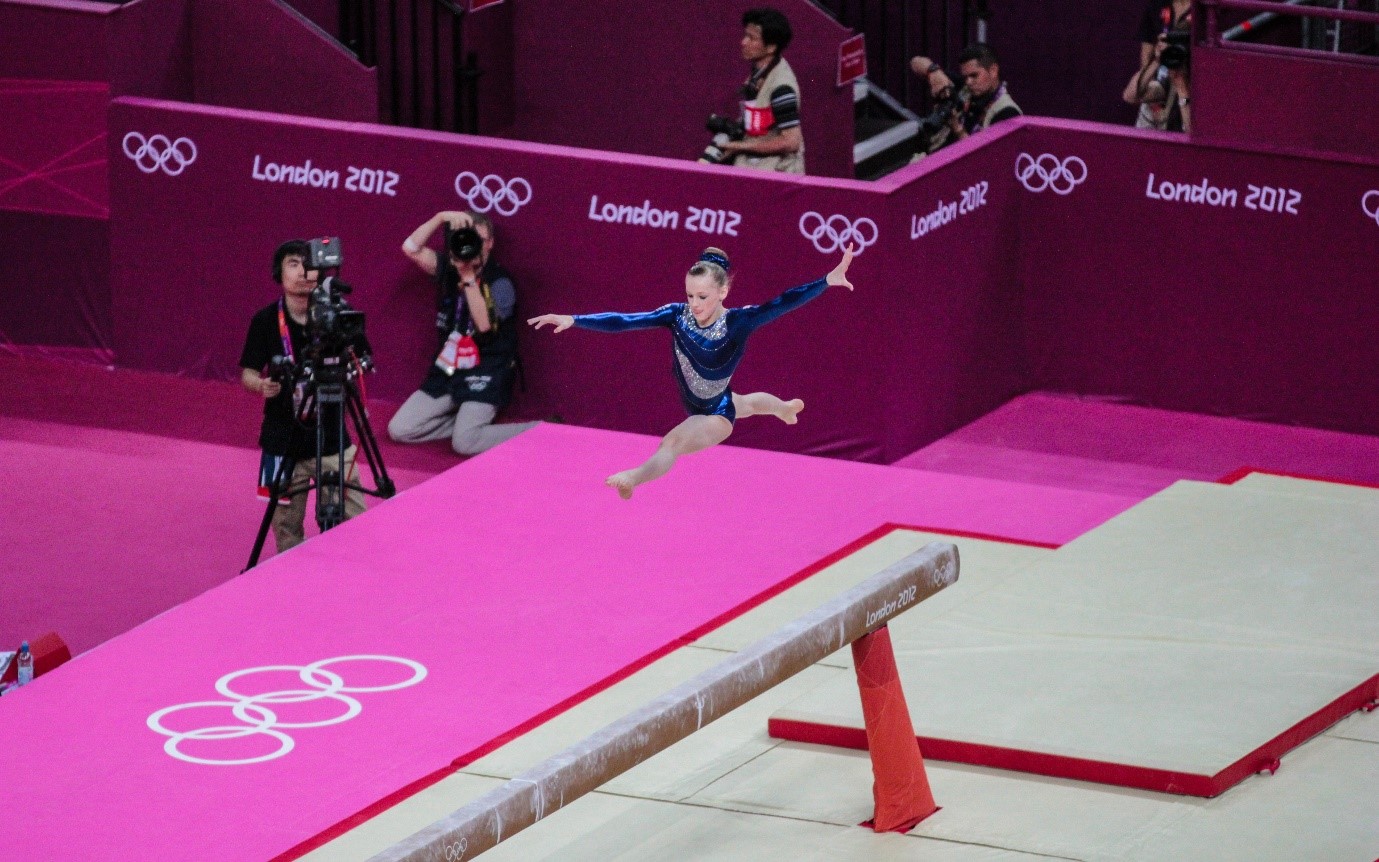
BACK TO ALL OLYMPICS
Est. 2018 | © GymnasticsHistory.co.uk 2025

